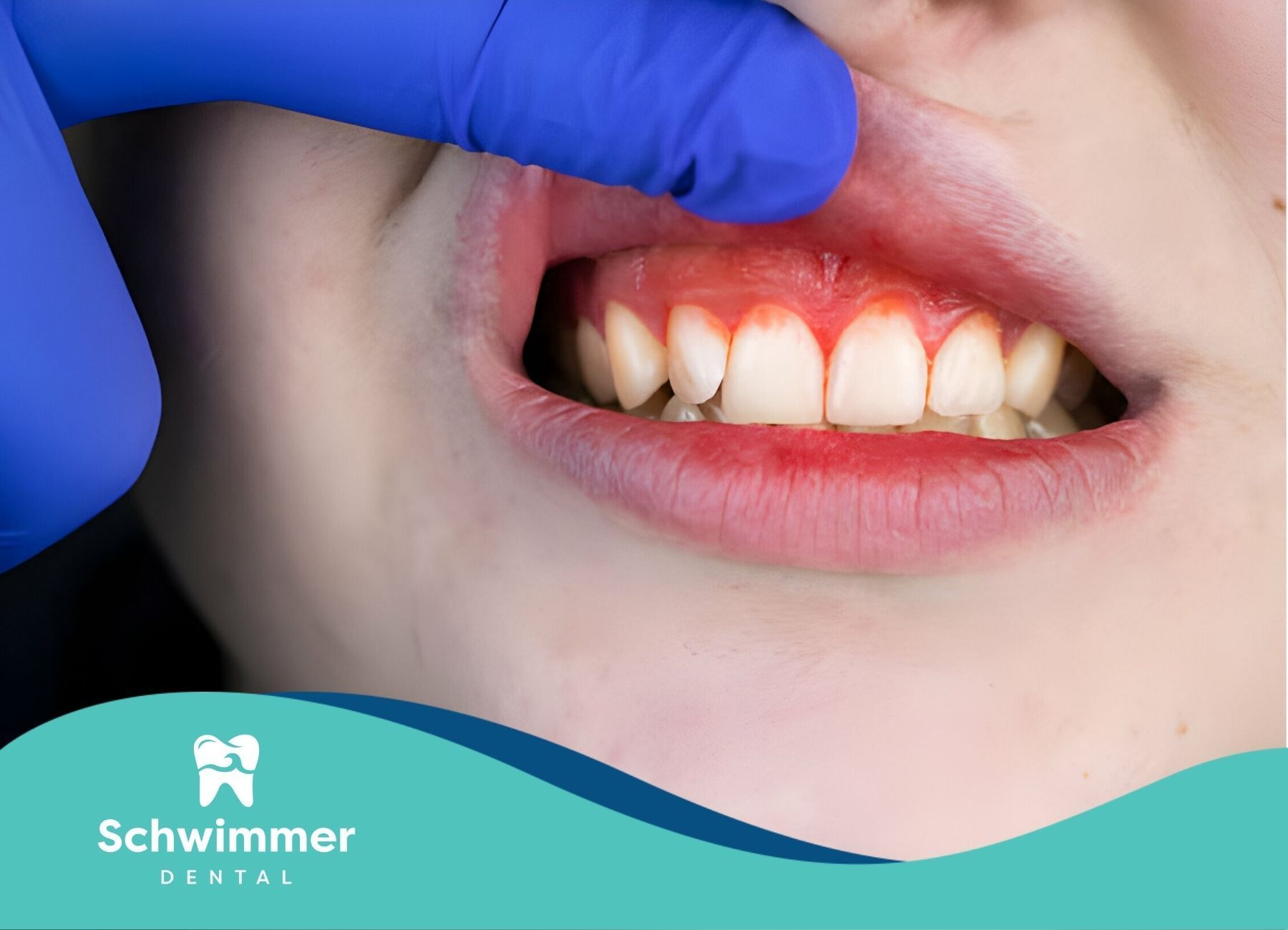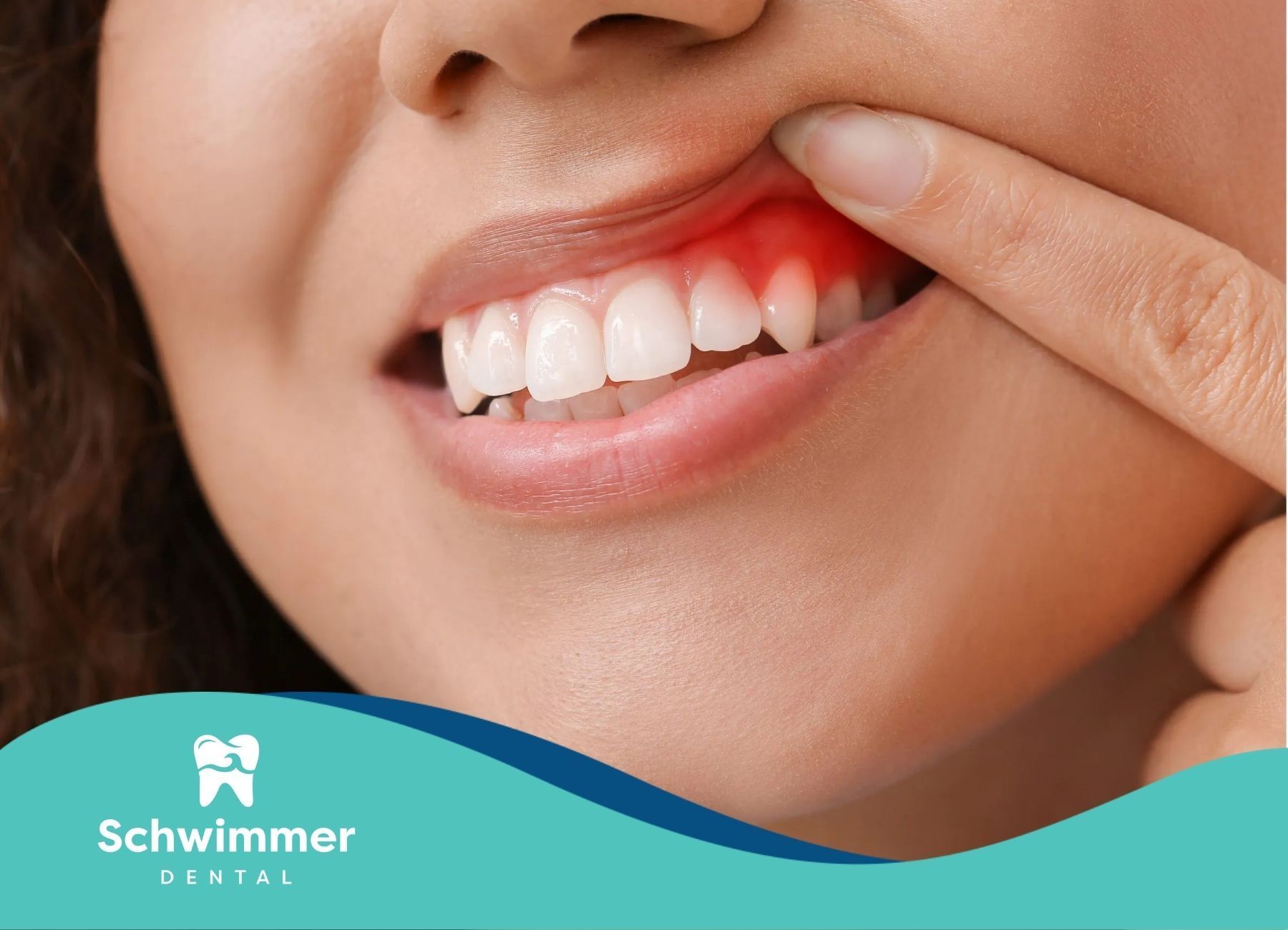Have an appointment? Complete the Intake Form
Dental Implant Aftercare: Essential Dos and Dont's
A dental implant procedure is an important investment for your oral health, providing a lasting solution for missing teeth. The healing process after the implant is critical for its long-term success. This guide focuses on dental implant aftercare, detailing the steps you need to take for proper healing to make the most of your new smile.
Understanding Dental Implant Aftercare
Proper aftercare for dental implants involves steps to promote healing, avoid complications, and ensure the longevity of your implant. This care begins immediately after your surgery and continues throughout the healing period and into long-term maintenance.
Key aspects of dental implant aftercare include managing immediate post-surgery effects such as swelling, discomfort, and minor bleeding. Following a specific oral hygiene routine is also crucial to keeping the surgical site clean, promoting tissue healing, and preventing infections. By closely adhering to your dentist's instructions, you can ensure optimal recovery and implant stability.
The Importance of Proper Aftercare
Effective aftercare for dental implants plays a vital role in ensuring the success of your procedure. The healing process is delicate, and any issues at the implant site can slow recovery or compromise the stability of the implant. Keeping the surgical site clean is paramount to avoid infections like peri-implantitis, which can lead to bone loss or implant failure.
Post-operative aftercare dental implant surgery also includes dietary adjustments to facilitate healing and ensure successful osseointegration—the process where the implant fuses securely with the jawbone. This step is critical for achieving a stable, natural-feeling implant.
Immediate Steps to Take Post-Surgery
After your dental implant surgery, managing comfort and preventing complications are top priorities. Here are some essential steps for aftercare dental implants:
- Pain Management: Take prescribed pain medications as directed by your dentist. If the pain persists or worsens, inform your dentist promptly.
- Swelling Control: Apply an ice pack to the side of your face for short intervals during the first 24–48 hours to reduce swelling.
- Oral Hygiene: Gently rinse with warm salt water as directed. Avoid brushing near the surgical site for the first few days to prevent disturbing the area.
A Beginner's Guide to Dental Implant Care
Navigating aftercare dental implant surgery can feel overwhelming, but a step-by-step approach makes it manageable. Taking care of discomfort, maintaining oral hygiene, and adjusting your diet all contribute to a smooth recovery.
For effective dental implant removal aftercare in case of adjustments or complications, follow your dentist’s specific guidance. Ensuring proper healing is key to a successful outcome.
What You'll Need for Effective Aftercare
To promote recovery, follow these essential steps for dental implants aftercare:
- Pain Management: Take prescribed medications and monitor for unusual side effects.
- Oral Hygiene: Use a soft-bristled toothbrush and rinse gently with warm salt water.
- Swelling Reduction: Apply an ice pack as needed to manage inflammation.
Each step in your dental implant aftercare is designed to ensure healing and long-term success.
Step 1: Managing Pain and Swelling
Discomfort and swelling are normal after surgery, like getting a dental implant. The good news is that you can manage these effects with the right care. Your dentist will give you a specific plan to help with this.
Your main way to handle pain is by taking the pain medication your dentist prescribes. It's important to start taking it as instructed, even if the pain is not bad at first. This helps keep your pain level manageable and stops it from getting worse.
Using an ice pack on the side of your face can also help reduce swelling, especially in the first 24 to 48 hours after surgery. The cold helps your blood vessels get smaller, which decreases blood flow and lowers swelling.
Step 2: Oral Hygiene Practices Post-Surgery
Keeping your mouth clean after dental implant surgery is very important. This helps you heal and keeps infections away. Your routine might change a bit at first but don't worry. These changes are just temporary and protect where you had surgery.
For the first 24 hours after your surgery, rinse gently with warm salt water. It is important to avoid strong rinsing. Strong rinsing can ruin the blood clot that forms in the surgical area, and that clot is needed for healing.
Starting the day after your surgery, you can slowly start brushing your teeth again. Use a soft-bristled toothbrush and be very careful around the surgical area. Try to avoid touching that area for the first few days:
- Gentle Brushing: Use a soft-bristled toothbrush and be gentle.
- Avoid the Surgical Site: Do not brush on the implant area for the first days.
- Salt Water Rinses: Rinse with warm salt water 3-4 times a day.
- Follow Instructions: Stick to your dentist's advice for taking care of your mouth.
Step 3: Diet and Nutrition for Healing
Your diet after dental implant surgery is very important for healing. Right after the surgery, it is best to eat soft foods. This helps reduce stress on the area where the surgery was done. It's even more important if you have a bone graft along with the implant.
Good soft foods include yogurt, smoothies, mashed potatoes, soups, and well-cooked vegetables. Stay away from hard, crunchy, chewy, spicy, or acidic foods. These can bother the surgical site and slow down healing.
As you heal and feel less pain, you can slowly start to eat solid foods again. Just be careful to avoid very hard or sticky foods that could move the implant or slow recovery. Your dentist will tell you when you can go back to your normal diet based on your situation.
Proper dental implant aftercare is essential to ensure long-lasting results and a healthy smile. Following your dentist's instructions can help prevent complications and support the healing process after your procedure.
If you’re searching for dental implants near me, it’s crucial to choose a provider who performs the procedure with precision and offers comprehensive aftercare guidance. From maintaining oral hygiene to monitoring healing progress, partnering with an experienced dental team can make all the difference in achieving successful outcomes and a confident smile.
Common Mistakes to Avoid After Dental Implant Surgery
After dental implant surgery, it is important to be careful during recovery. Some common mistakes can slow down healing or cause issues. Most of the time, these errors happen because people do not know how important aftercare is for success.
This section lists common mistakes patients make. It helps you learn what to avoid so you can heal well and keep your dental implant healthy for a long time.
Neglecting Oral Hygiene
It might seem easy to skip cleaning your mouth after oral surgery when you feel discomfort. However, keeping your mouth clean is very important. Just like real teeth, plaque and germs can build up around the implant site. This makes it easier for infections to start.
You should start good oral hygiene again as soon as your dentist says it’s okay. This is usually within the first day or two after surgery. Start with gentle rinses using warm salt water. Gradually add brushing with a soft-bristled toothbrush, but don't touch the surgical area directly.
If you ignore oral hygiene, it could lead to serious issues like peri-implantitis. This infection can harm the soft and hard tissues around the implant and even result in implant failure.
Overlooking Signs of Infection
It is important to watch for signs of infection after dental implant surgery. The earlier you notice a problem, the quicker you can get treatment. This helps avoid issues that could affect the success of your implant. Some discomfort and swelling are normal, but if symptoms get worse or last too long, you should seek help right away.
Signs of an infection can be more pain at the implant site, redness and swelling that doesn’t go down, ongoing bleeding or pus, a loose implant, or bad breath and taste that won't go away.
If you notice any of these signs, contact your dentist without delay. Regular dental checkups are important for keeping track of the healing process and for resolving any issues.
Conclusion
Proper care after getting a dental implant is very important. It helps you heal well and keeps your implant stable for a long time. To recover effectively after your surgery, follow these steps:
- Manage any pain you may feel.
- Keep your mouth clean and practice good oral hygiene.
- Follow a healthy and suitable diet.
Be careful not to make common mistakes, like skipping your oral hygiene routine or ignoring signs that you might have an infection. These mistakes can negatively affect your dental implant procedure. Your oral health is an investment in a great smile and good overall health. If you’re worried or have questions about dental implant aftercare, our experts are ready to help.
Schwimmer Dental stands out as New Jersey’s premier dental clinic, offering unparalleled expertise in dental implant procedures and personalized aftercare. Our commitment doesn’t end with the surgery—we guide you every step of the way to ensure a smooth recovery and long-lasting results. Trust our experienced team to provide the care and support you need for a confident, healthy smile. Ready to experience exceptional dental care? Book your appointment today and let Schwimmer Dental transform your oral health!
Frequently Asked Questions
How long after dental implant surgery can I eat normally?
The recovery time can differ for everyone. However, it is usually safe to start eating solid foods again within a week or two after dental implant surgery. It is important to stay away from very hard, crunchy, or sticky foods at first. These foods might get stuck around the implant during the healing process. Always check with your dentist for specific dietary advice that fits your needs.
What are the signs of dental implant rejection?
Implant rejection is uncommon. However, it is important to know the signs. These signs can look like an infection. They include long-lasting pain or discomfort, loose implants, swelling around the implant site, and bone loss near the implant. Regular dental checkups are important for finding and dealing with any problems early.
Need Assistance? We’re Here to Help
We are dedicated to enhancing your dental health and well-being.
We provide personalized dental care solutions for a confident, healthy smile.
Contact us today for Professional Dental Care.

Our caring staff will help you feel relaxed and comfortable in our state of the art office. We respect your time and pledge to deliver prompt service, backed by the latest knowledge, techniques, and technology.
Email: Office@schwimmerdental.com
Tel: (848) 294-2385
Fax: (732) 899-3347
Address: 1115 Arnold Ave,
Point Pleasant, NJ, 08742
Schwimmer Dental – Website by CWS


